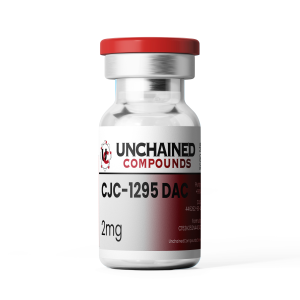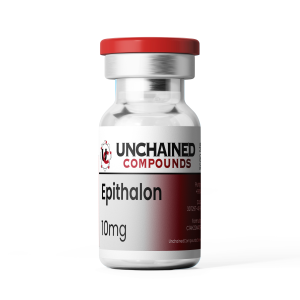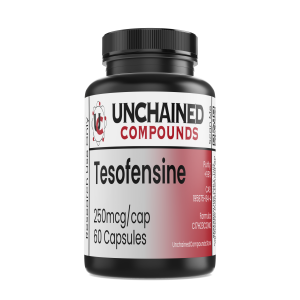Description







Tesofensine is a serotonin-noradrenaline-dopamine reuptake inhibitor which was originally studied for its effect on Parkinson’s and Alzheimer’s. Unfortunately, its exploration for these indications were limited because the research subjects starting losing too much weight. Since then, tesofensine has been studied as a way to treat obesity via its ability to reduce appetite. This molecular compound indirectly stimulates the cholinergic system and showed to be more successful than other weight loss agents. Tesofensine (TE) increases transmission of 3 monoaminergic neurotransmitters in the brain. These neurotransmitters are serotonin, norepinephrine, and dopamine which help regulate energy balance and are linked to obesity and depression. On average, its 6-month weight loss results from a phase 2b clinical trial resulted in a weight loss of around 25 pounds. TE research has shown a pronounced effect on appetite sensations and a slight effect on energy expenditure. Both effects can contribute to the strong weight reducing effect.
Specifications
- Chemical Formula: C17H23Cl2NO
- Molecular Mass: 328.28 g/mol
- Synonyms:
- CAS Number: 195875-84-4
- PubChem: 11370864
- Total Amount of the Active Ingredient: 250mcg per capsule – 60 Capsules
- Shelf Life: 36 months
Peer-Reviewed Studies
Weight loss produced by Tesofensine in patients with Parkinson’s or Alzheimer’s disease
Abstract
Objective: Tesofensine (TE) is a norepinephrine, dopamine, and serotonin reuptake inhibitor. We conducted a meta-analysis of TE’s effect on body weight in trials investigating its potential for treatment of Parkinson’s or Alzheimer’s disease.
Methods and procedures: Four randomized, double-blind, multicenter trials compared TE (n = 740) and placebo (n = 228), two in each disease. Patients received oral TE or placebo once daily for 14 weeks without any weight loss program. Results were adjusted for baseline values, age, and study.
Results: In the placebo group, 14% were obese and 21% were in the TE group. In the total cohort, weight change after 14 weeks was +0.5, -0.5, -0.9, -1.8, -2.8% in the placebo, 0.125, 0.25, 0.5 and 1.0 mg in the TE groups, respectively (P = 0.015 for dose effect). In the obese subgroup, weight changes were -0.2, -1.7, -1.6, -1.5, -3.7%, and 2.1, 8.2, 14.1, 20.9, 32.1% of the obese patients achieved > or = 5% weight loss (P < 0.001 for 0.25, 0.5, and 1.0 mg vs. placebo for both end points). Changes in heart rate were -0.4, 2.1, 4.2, 6.0, and 6.8 bpm after 14 weeks (TE vs. placebo: P < 0.001 from 0.25 mg), but no effect on blood pressure was observed.
Discussion: TE produced a placebo-subtracted weight loss of approximately 4% for >14 weeks without any diet and lifestyle therapy, which is similar to that of sibutramine, but with no effect on blood pressure. On the basis of these results, TE is now being developed for obesity management.
Abstract
Tesofensine is a novel monoamine reuptake inhibitor that inhibits both norepinephrine, 5-HT, and dopamine (DA) reuptake function. Tesofensine is currently in clinical development for the treatment of obesity, however, the pharmacological basis for its strong effect in obesity management is not clarified. Using a rat model of diet-induced obesity (DIO), we characterized the pharmacological mechanisms underlying the appetite suppressive effect of tesofensine. DIO rats treated with tesofensine (2.0 mg/kg, s.c.) for 16 days showed significantly lower body weights than vehicle-treated DIO rats, being reflected by a marked hypophagic response. Using an automatized food intake monitoring system during a 12 h nocturnal test period, tesofensine-induced hypophagia was investigated further by studying the acute interaction of a variety of monoamine receptor antagonists with tesofensine-induced hypophagia in the DIO rat. Tesofensine (0.5-3.0 mg/kg, s.c.) induced a dose-dependent and marked decline in food intake with an ED(50) of 1.3 mg/kg. The hypophagic response of tesofensine (1.5 mg/kg, s.c.) was almost completely reversed by co-administration of prazosin (1.0 mg/kg, alpha(1) adrenoceptor antagonist) and partially antagonized by co-administration of SCH23390 (0.03 mg/kg, DA D(1) receptor antagonist). In contrast, tesofensine-induced hypophagia was not affected by RX821002 (0.3 mg/kg, alpha(2) adrenoceptor antagonist), haloperidol (0.03 mg/kg, D(2) receptor antagonist), NGB2904 (0.1 mg/kg, D(3) receptor antagonist), or ritanserin (0.03 mg/kg, 5-HT(2A/C) receptor antagonist). Hence, the mechanism underlying the suppression of feeding by tesofensine in the obese rat is dependent on the drug’s ability to indirectly stimulate alpha(1) adrenoceptor and DA D(1) receptor function.
Abstract
Background: Tesofensine (TE) is a new drug producing twice the weight loss in obese individuals as seen with currently marketed drugs. It inhibits the presynaptic reuptake of the neurotransmitters noradrenaline, dopamine and serotonin, and is thought to enhance the neurotransmission of all three monoamines. The mechanisms by which it produces weight loss in humans are unresolved.
Objective: The aim of this study is to investigate the mechanism(s) behind weight reduction by measuring energy expenditure and appetite sensations in overweight and obese individuals.
Design: Thirty-two healthy, overweight or moderately obese men were treated with 2.0 mg TE daily for 7 days followed by an additional 7 days with 1.0 mg TE daily or corresponding placebo (PL) in a randomized, controlled trial. They were instructed to maintain habitual food intake and physical activity throughout. Twenty-four-hour energy expenditure (24-h EE), fat oxidation and spontaneous physical activity were measured in a respiration chamber before and after treatment. Body composition was assessed by dual-energy X-ray absorption and appetite was evaluated by visual analogue scales in conjunction with a standardized dinner.
Results: Despite efforts to keep body weight and composition constant, TE induced a 1.8 kg weight loss above PL after 2 weeks’ treatment (P<0.0001). TE also induced higher ratings of satiety and fullness and concomitantly lower prospective food intake than placebo. No significant effect of TE on total 24-h EE could be demonstrated compared with PL, but higher energy expenditure was observed during the night period (4.6%; P<0.05) when adjusted for changes in body composition. Furthermore, TE increased 24-h fat oxidation as compared with PL (18 g; P<0.001).
Conclusion: TE has a pronounced effect on appetite sensations and a slight effect on energy expenditure at night-both effects can contribute to the strong weight-reducing effect of TE.
Disclaimer
The information provided above is not intended to substitute medical advice, diagnosis, or treatment. Should you have any questions regarding a medical condition, seek the advice of your physician or a qualified healthcare provider. In no case should medical advice be disregarded or delayed because of what you have read or seen. We bear no responsibility or liability for your use of any of our research compounds and products. Please note that they are being sold for research purposes ONLY. We do NOT condone any personal use.
NOTE: In some cases wherein the assigned top colors are out of stock, a different top color will be used to ensure that your order will not be delayed. Should you need assistance identifying the peptide vial that you received, please send us an email at support@unchainedcompounds.store.
ALL ARTICLES AND PRODUCT INFORMATION PROVIDED ON THIS WEBSITE ARE FOR INFORMATIONAL AND EDUCATIONAL PURPOSES ONLY.
The products offered on this website are intended for in-vitro studies only. In-vitro studies (Latin: “in glass”) are performed outside the body. These products are not medicines or drugs and have not been approved by the FDA to prevent, treat, or cure any medical condition, ailment, or disease. Bodily introduction of any kind into humans or animals is strictly forbidden by law.








